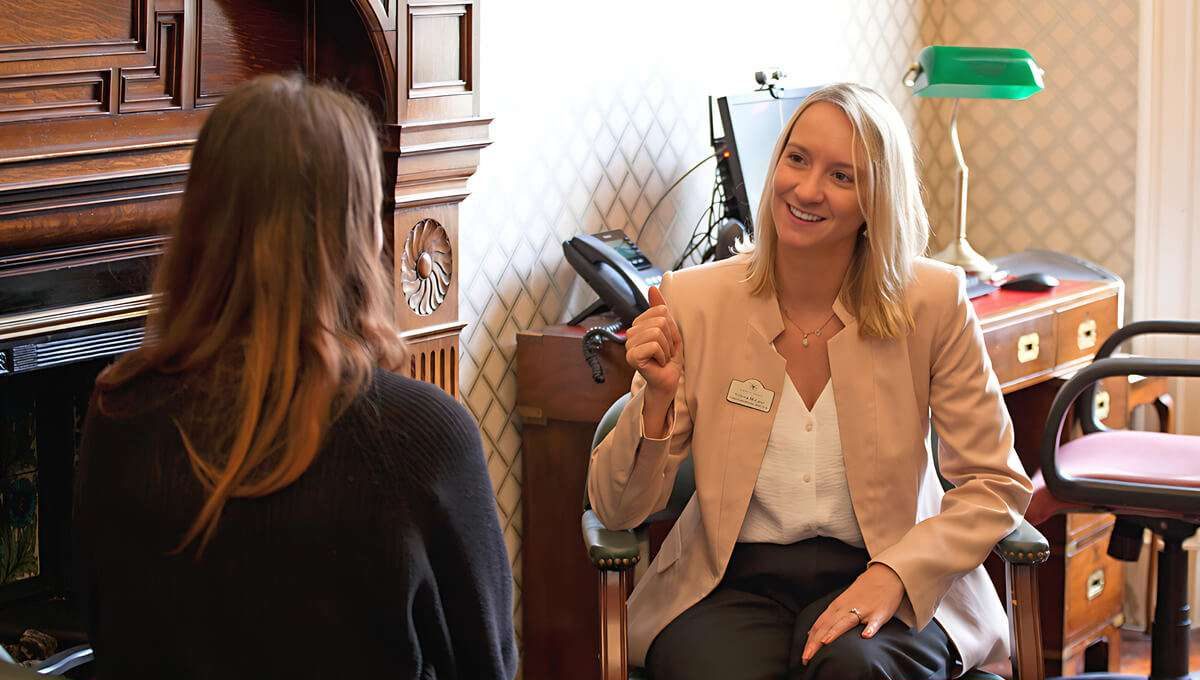
Residential Rehab for Ecstasy Addiction
Taking the first step towards recovery from ecstasy addiction can be life-changing. At Castle Craig we are here to support you every step of the way. Exploring our residential ecstasy rehab care plans could mark the beginning of a new chapter filled with hope and freedom. We understand that reaching out for personal help with drug issues might feel overwhelming. We will always honour your need for discretion and provide a safe and confidential environment dedicated to your recovery.
Our experienced team is here to guide you through the process, answering any questions you may have along the way. If you’d like to learn more about our specialised ecstasy addiction treatment options, contact us today in complete confidence. Call 01721 546 263, or complete our online form, and we will get back to you promptly to discuss how we can help you or a loved one find the path to healing.
What is Ecstasy?
Ecstasy, scientifically known as MDMA, is a psychoactive drug primarily used for recreational purposes. It alters perceptions and enhances feelings of happiness and sociability by increasing the activity of neurotransmitters like serotonin and dopamine in the brain.
Originally developed for medical use, ecstasy is often associated with nightlife and parties. However, its misuse can lead to both short-term risks, such as dehydration and overheating and long-term effects, including emotional and cognitive challenges.
Common Names for Ecstasy
Ecstasy, or MDMA, often goes by several nicknames, though there can be some slight differences between these terms. For example, some forms may be pure MDMA, while others might be mixed with additional substances. Below are some common names:
- MDMA: MDMA is the chemical name for ecstasy, often used to describe its purest form.
- E, X, XTC: These are shorthand variations commonly used in social or recreational contexts. ‘E’, in particular, was typically used in UK nightclubbing settings.
- Adam, Molly, Mandy: “Adam” refers to an early nickname, signifying innocence or a ‘whole’ feeling. “Molly” (US slang) typically indicates pure MDMA, while “Mandy” (UK slang) is another familiar term for it.
- Love Drug, Happy Pills, Scooby Snacks, Party Pills, Hug Drug: These names capture the euphoric and social effects associated with MDMA use. However, their fun connotations can mask the risks and dangers of misuse.
Though these names are widely known in different parts of the world, it’s important to recognise that the content and composition of ecstasy pills under any of these labels can significantly vary.

Start Your Recovery at a Residential Rehab Today
Free Ecstasy Addiction Assessment
Castle Craig offers free ecstasy drug addiction assessments as part of the admissions process to help you take the first step towards recovery. Our expert team is here to listen, understand your concerns, and provide compassionate guidance, ensuring you feel supported and informed throughout the process.
After the assessment, we can design a tailored addiction treatment plan to meet your unique needs. Whether you’re seeking individual care or a plan for couples, our personalised approach ensures you receive effective and specialised support for a brighter future. Call us today on 01721 546 263 or complete our secure contact form to start your recovery journey.
Is Ecstasy (MDMA) Addictive?
Yes, ecstasy can be addictive for some users, though its addictive potential is more psychological than physical. The drug’s impact on neurotransmitters can create dependency, with users seeking its euphoric effects more regularly, and in some cases repeatedly.
Prolonged use can lead to greater tolerance, meaning higher doses are needed to achieve the same effects. Psychological addiction may manifest as cravings, anxiety or emotional withdrawal, highlighting the need for professional intervention in many cases.
What is an Ecstasy (MDMA) Rehab Clinic?
An ecstasy rehab clinic provides specialised support for those struggling with MDMA dependency, focusing primarily on psychological treatment. Specialist drug rehab clinics address the emotional and behavioural aspects of addiction through therapies such as counselling, cognitive-behavioural therapy and group support.
The intensity of ecstasy addiction varies from person to person. Seeking advice from experts in rehabilitation allows for a unique recovery plan to be developed, offering the best chance of long-lasting results.


What is a Residential Ecstasy Rehab Centre?
A residential ecstasy rehab centre is a facility where you live on-site while receiving comprehensive addiction treatment. Residential drug rehab centres can provide you with a structured, distraction-free environment to focus entirely on recovery from MDMA dependency.
Residential addiction rehab centres often offer round-the-clock support, holistic therapies and a wide range of personalised treatments. A truly immersive approach can help you build the skills, resilience, and confidence needed to maintain sobriety in the long term.
Common Types of Ecstasy Addiction Treatment Programmes
At Castle Craig, we understand that everyone’s experience with ecstasy addiction is unique. That’s why we create personalised treatment plans designed specifically to meet your needs. Our approach considers your personal circumstances, challenges, and goals to provide effective, compassionate care.
Below, you’ll find examples of the types of support we offer. Please note that this is not an exhaustive list, and our team will always work with you to craft a plan that reflects your own recovery requirements.
-
Residential and Inpatient Ecstasy Rehab Centres
Residential and inpatient rehab centres are at the heart of our approach to ecstasy addiction recovery. Secure care facilities provide a safe and structured environment where you can focus entirely on healing, free from the distractions and temptations of daily life.
Our centres offer 24/7 medical care and therapeutic support, combining evidence-based treatments with a tranquil setting to foster recovery. Living on-site ensures access to a full range of services, including therapy sessions, holistic treatments and personalised care plans designed to facilitate long-term success.
-
Private, Luxury and Premium MDMA Rehabs
For those seeking privacy and comfort, luxury addiction treatment centres offer discreet and premium care. A blend of world-class treatment options and high-end amenities, offer an excellent chance for you to recover in a serene and exclusive environment.
From private rooms to gourmet dining and bespoke therapies, luxury rehabs cater to patients who value discretion and personalised care. A premium experience focusing on your specific requirements prioritises your healing while maintaining the highest standards of confidentiality and comfort.
-
28-Day, 60-Day and 90-Day Ecstasy Misuse Recovery
Recovery from ecstasy misuse requires time, commitment and the right framework. Flexible care plans lasting 28 days, 60 days, 90 days or longer could be the right fit for you, depending on your needs and the severity of your addiction.
Each duration provides a comprehensive schedule, including detoxification, therapy sessions and relapse prevention training. Long-term rehab plans, such as the 90-day option, are ideal for addressing deeper-rooted challenges and ensuring a gradual, sustainable return to a drug-free life.
-
Ecstasy Detox Programme and Withdrawal Treatment
Detoxing from ecstasy is often the initial step in recovery and involves safely looking after your needs during the withdrawal process. Our medically managed residential detox will prioritise your comfort and safety while addressing physical and psychological symptoms.
Our experienced medical team supports you through every stage of detox, offering interventions to alleviate discomfort and regular assessments to monitor progress. Our fully supervised care sets a strong foundation for the next stages of your recovery.
-
Ecstasy Addiction Counselling and Therapy
Therapy is a crucial part of overcoming ecstasy addiction. Our addiction counselling care plans focus on identifying underlying triggers, reshaping harmful behaviours and encouraging emotional resilience. We offer a range of therapies, including cognitive-behavioural therapy (CBT), group sessions and individual one-on-one counselling.
Trained therapists work with you to set achievable goals, address challenges and build coping mechanisms. Our compassionate approach ensures that counselling sessions are both practical and empowering, helping you regain control over your life.
-
Long-Term Ecstasy Recovery and Relapse Prevention
Long-term recovery solutions are essential for equipping you with strategies and tools to maintain sobriety while juggling demanding responsibilities. Support is designed to fit seamlessly into your lifestyle, making sure that recovery complements every part of your life moving forward.
Our approach includes access to ongoing counselling, support networks and continuing care resources designed to provide long-term guidance. By addressing career-specific challenges and personal needs, we help you build a sustainable path to recovery, helping you to prioritise well-being without compromising your busy life.
Ecstasy Addiction Rehab Treatment Centre Near Me
Finding the right support is crucial when overcoming ecstasy addiction. Castle Craig offers expert-led care plans in a tranquil and supportive environment. Below, you’ll find more details about our residential rehab and how to get in touch for compassionate, professional help tailored to your needs.

Castle Craig Ecstasy Rehab Centre
Located in the serene countryside of West Linton, Edinburgh, United Kingdom, EH46 7DH, Castle Craig provides a peaceful setting that promotes healing and recovery. Our location offers the ideal escape from daily pressures, allowing you to focus completely on achieving lasting well-being.
Find Us
01721 546 263
info@castlecraig.co.uk
Castle Craig,
West Linton, Edinburgh, United Kingdom, EH46 7DH
To take the next step in your recovery, call us at 01721 546 263. Our team is ready to provide more information about our addiction treatment care plans, helping you or a loved one find the path to a healthier, brighter future.
-
How to Find MDMA Addiction Treatment Near You
When searching for the right rehabilitation centre for MDMA addiction, it’s essential to consider several factors to find a treatment option suited to your needs. Below are key areas to explore and questions to ask to ensure you or your loved one can access effective and compassionate care.
- Search Online for MDMA Addiction Rehab Centres: Start by using keyword searches such as “MDMA addiction treatment near me” or “MDMA detox and recovery centre.” This will help you discover a range of local options. Many facilities have detailed websites outlining their services, treatment approaches, and success rates, so you can easily compare them.
- Explore Private Ecstasy Rehab Clinics: Private rehab clinics often offer exclusivity and specialised care plans. Search for terms like “ecstasy rehab near me” or “ecstasy addiction treatment UK” if you are looking for drug-specific care plans. Private centres typically provide flexibility, luxury facilities and a focus on personal comfort to aid in recovery.
- Ask About the Length of Stay at Inpatient Ecstasy Rehab: Understanding time commitments is crucial. While the length of stay can vary based on different needs, many rehabs offer structured options such as 28-day, 60-day, or 90-day care plans. Ask about flexibility and what factors may influence the recommended duration.
- Ask About Specialist Programmes: Comprehensive rehab centres often include treatment plans tailored to specific challenges, such as co-occurring mental health issues, trauma or family involvement. Enquire about the availability of care plans designed to address your unique circumstances or those of your loved one.
- Ask About Their Accreditation and Expertise: Accreditation signifies quality and reliability. Check whether the centre is certified by reputable organisations, and ask about the qualifications of their medical and therapeutic teams. Experienced professionals and evidence-based practices can make a significant difference in achieving long-term recovery.
What is the Best Ecstasy Rehab Care Plan?
There is no universally accepted solution for overcoming ecstasy addiction. At Castle Craig, we craft person-focused rehabilitation care plans that address your specific challenges and goals. With over 35 years of experience, we provide evidence-based treatment to promote lasting recovery and help patients achieve a fulfilling life following ecstasy addiction challenges.
Generally, residential ecstasy rehab programmes deliver high success rates. Services such as inpatient ecstasy rehab, medically managed MDMA detox and ecstasy relapse prevention are designed to ensure a safe withdrawal from ecstasy and sustained recovery. Speak with our experienced team on 01721 546 263 to discuss your unique needs and explore options including 12 Step programmes, sober living for ecstasy recovery and aftercare for MDMA rehab graduates.

Find out About our Ecstasy Rehab Treatment
Castle Craig provides free addiction assessments as part of the admissions process to help you take the first step towards recovery. Our experienced and compassionate professionals will listen to your concerns, evaluate your needs and offer expert guidance on the most suitable treatment options for you or your loved one.
We specialise in creating personalised treatment plans designed to address unique circumstances and recovery goals. Our team can also provide information on the potential cost of rehab, ensuring you have a clear understanding of your options. Contact us today to take the next step – call 01721 546 263 or complete our secure online form for prompt assistance.
Free Ecstasy Addiction Assessment
Taking the first step and asking for help can feel daunting, but our team is here to assist you.
Ecstasy Addiction Treatment Process at a Residential Rehab Centre
Ecstasy addiction treatment at a residential rehab centre is designed to meet the unique needs of each patient. Care plans are tailored, incorporating various research-backed treatments and support measures to provide the most effective path to recovery. Below is an outline of key stages in the private rehab process.
- Initial Assessment & Admissions Process: The treatment process typically begins with a comprehensive assessment by experienced professionals. This helps identify the patient’s specific needs, medical history and personal challenges. The admissions team works to ensure a smooth and supportive transition into the rehab environment.
- Medically Managed Ecstasy Detox (if needed): For those requiring detoxification, medically managed procedures are provided to ensure safety and comfort. The detox stage is crucial for managing withdrawal symptoms under the care of trained medical staff, enabling a safe withdrawal from ecstasy while minimising health risks.
- Inpatient Residential Treatment and Therapy: Structured inpatient residential care allows you to participate in a variety of psychotherapy sessions, including one-to-one counselling, group therapy and family therapy. The focus here is on identifying the root causes of addiction, developing coping mechanisms and building emotional resilience.
- Holistic Therapies and Well-being Support: Residential rehab centres often integrate holistic therapies such as mindfulness, yoga and art therapy. These approaches enhance emotional well-being, reduce stress and support overall health, complementing the primary treatments.
- Relapse Prevention and Long-Term Recovery Planning: A key part of the rehab process is planning for life beyond treatment. Programmes may include workshops on recognising triggers, developing relapse prevention skills, and creating a structured post-rehab recovery plan.
- Continuing and Ongoing Support: Recovery doesn’t end with residential treatment. Aftercare services such as support groups, therapy sessions and access to sober living arrangements are essential for maintaining sobriety and fostering continuous improvement. This helps you to gain the tools needed for long-term success in their recovery journey.

Ecstasy Addiction and Mental Health Disorder Treatment
Some rehab centres solely focus on treating addiction or mental health conditions, without addressing both. This can leave those with co-occurring disorders feeling unsupported in their recovery, as dual conditions require an integrated approach for effective treatment and long-term success.
At Castle Craig, we specialise in dual diagnosis treatment, offering comprehensive care for those struggling with ecstasy misuse alongside mental health challenges. Below are examples of co-occurring disorders we address through our tailored rehabilitation schemes.
-
Anxiety Disorders and Ecstasy Misuse
Anxiety disorders, such as generalised anxiety disorder (GAD), panic disorder, social anxiety disorder and specific phobias, can lead to a feeling of being overwhelmed and trapped by persistent worry or fear. Some may turn to substances like ecstasy as a way to escape these feelings temporarily. Ecstasy, often known for its euphoric and relaxing effects, might initially seem to alleviate anxiety symptoms. However, prolonged misuse can intensify these conditions, leading to increased panic attacks or a deeper sense of fear and unease.
Obsessive-compulsive disorder (OCD), a condition characterised by intrusive thoughts and repetitive behaviours, can also be made worse by ecstasy misuse. While the drug may momentarily suppress compulsions or intrusive thoughts, its impact on serotonin levels can exacerbate OCD symptoms in the long term. Comprehensive treatment that addresses both anxiety disorders and ecstasy addiction is essential to break this cycle and promote lasting recovery.
-
Depression & Mood Disorders with Ecstasy Misuse
Mood disorders, including major depressive disorder, bipolar disorder (types I & II), cyclothymic disorder, persistent depressive disorder (dysthymia) and seasonal affective disorder (SAD) are often linked with feelings of sadness, hopelessness or unstable mood patterns. People struggling with mood disorders may misuse ecstasy in pursuit of the short-lived emotional high it may provide. However, repeated use can deplete serotonin levels, worsening depressive symptoms and triggering severe mood swings.
For those with disorders like bipolar disorder, ecstasy misuse can severely destabilise mood, potentially leading to manic or depressive episodes. The interplay between mood disorders and substance misuse can be complicated, but dual diagnosis treatment that addresses both conditions simultaneously can provide a stable foundation for recovery and emotional wellbeing.
-
ADHD and Ecstasy Misuse
Attention-deficit/hyperactivity disorder (ADHD) is marked by inattention, impulsivity and hyperactivity. Patients with ADHD are at a higher risk of substance misuse, including ecstasy, as they often seek ways to self-medicate or cope with their symptoms. Ecstasy’s stimulating effects may temporarily enhance focus or create a sense of calm, but long-term use can disrupt cognitive functions and worsen attention difficulties.
The impulsive tendencies associated with ADHD can also lead to risky behaviours during ecstasy use, increasing the likelihood of harm. Addressing both ADHD and ecstasy misuse through an integrated treatment plan can help you manage your symptoms effectively and reduce any reliance on harmful substances.
-
PTSD & Trauma-Related Disorders with Ecstasy Misuse
Post-traumatic stress disorder (PTSD), acute stress disorder and complex PTSD (C-PTSD) are conditions that arise from traumatic experiences, often causing flashbacks, emotional numbness and a constant state of alertness. Some may turn to ecstasy as a way to dampen distressing memories or enhance feelings of connection. While the drug may provide temporary relief, it can intensify symptoms over time and make it harder to process trauma.
The use of ecstasy within this context can also disrupt sleep patterns and increase susceptibility to emotional instability, further complicating recovery from trauma. Effective treatment must combine trauma-focused therapy with addiction therapy to address the root causes and consequences of both PTSD and ecstasy misuse, paving the way for healing and resilience.

Contact Castle Craig Today
If you or a loved one are struggling with addiction, take the first step towards recovery by contacting Castle Craig. Every enquiry is handled with care and confidentiality to provide the support you deserve. To speak with a member of our team, call us today on 01721 546 263 or fill out our online form to get started. We are dedicated to helping you find the path to stable abstinence and a fulfilling, sober life.
How Much Does Comprehensive Inpatient Ecstasy Rehab Cost in the UK?
The cost for ecstasy addiction treatment in the UK typically falls between £18,000 and £40,000 for a 28- or 30-day programme. For patients opting for a six-week treatment plan, the price range increases to £27,000 to £60,000 – or more at premium centres. Prices can vary, so it’s important to consider options that suit your specific needs and circumstances.
The exact price may well vary based on the type of treatment plan you require. Personalised care plans, extended stays or specialised therapies may also influence the overall cost. For an accurate estimate tailored to your situation, it’s essential to speak directly with the rehab centre.
Does Private Health Insurance Cover Ecstasy Addiction Treatment?
Health insurance coverage for ecstasy addiction treatment varies depending on your provider, policy type and level of cover. Many insurers may be able to approve evidence-based treatment options at accredited facilities. However, to understand what your specific policy includes, it is essential to liaise directly with your insurance provider for clarity and confirmation.
If your insurance provider authorises your treatment with us, Castle Craig works with numerous major private health insurers and can support you through our insurance admissions process. If insurance is not an option for you, please call us on 01721 546 263 to explore alternative payment methods available.
Questions About Residential Ecstasy Rehab?
Contact us to discuss your treatment needs with a licensed clinician.
Contact Castle Craig Today
If you’re ready to begin your recovery journey, reach out to Castle Craig today to find out more about our private drug and alcohol rehab services. Our admissions process is tailored to offer professionalism and reassurance, ensuring you feel supported every step of the way. You can also arrange a confidential addiction assessment to explore the most suitable treatment options for you.
Call us on 01721 546 263 to start a private and supportive conversation. Alternatively, use the online form below to connect with our team and request a call back. We’re here to guide you with care and understanding when you need it most.
Ecstasy and Substance Addiction Rehab Related Guides
Alcohol Rehab | Drug Rehab | Adderall | Amphetamine | Ativan (Lorazepam) | Benzodiazepines | Buprenorphine | Cannabis | Clonazepam | Cocaine | Codeine | Crystal Meth | Ecstasy (MDMA) | Fentanyl | Heroin | Hydrocodone | Ketamine | Kratom | Morphine | Opioids | Oxycodone | OxyContin | Percocet | Tramadol | Valium | Xanax
Free & Confidential Assessment
Compassionate, expertly delivered evidence-based practices and a patient-centred approach are at the heart of our treatment model. Request a call-back from one of our professionals on any day of the week.
-
Statistics on MDMA Misuse in the UK
- In 2023, there were 79 drug-related deaths due to MDMA/ecstasy use in the UK. This was a rise of 28 recorded deaths from the precious year.
- In 2021-2022 approximately 12,200 ecstasy-type tablets were seized by Police Scotland.
- MDMA can be detected in your system for up to ninety days using certain types of drug tests though in general, it is detectable for up to five days.
- Studies have indicated an increased use of MDMA by those suffering with depression or other mental health disorders
- Studies have found that MDMA can lead to memory loss.